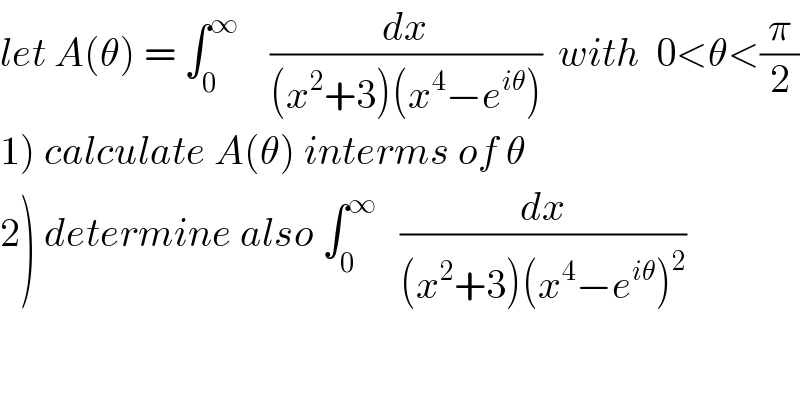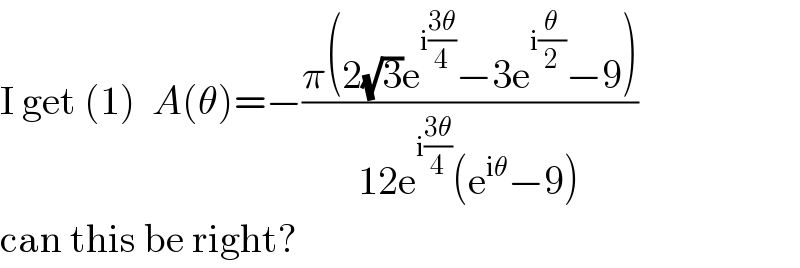
Question and Answers Forum
Question Number 67932 by mathmax by abdo last updated on 02/Sep/19

Commented byMJS last updated on 02/Sep/19

Commented bymathmax by abdo last updated on 02/Sep/19
![1) A(θ)=∫_0 ^∞ (dx/((x^2 +3)(x^4 −e^(iθ) ))) ⇒2A(θ)=∫_(−∞) ^(+∞) (dx/((x^2 +3)(x^4 −e^(iθ) ))) let W(z) =(1/((z^2 +3)(z^4 −e^(iθ) ))) poles of W? z^4 −e^(iθ) =0 ⇒z^4 =e^(iθ) let z =r e^(iα) ⇒r=1 and 4α =θ +2kπ ⇒ α_k =((θ+2kπ)/4) ⇒ the roots are Z_k =e^(i((θ+2kπ)/4)) and k∈[[0,3]] Z_0 =e^((iθ)/4) ,Z_1 =e^(i(((θ+2π)/4))) =e^(((iθ)/4)+((iπ)/2)) , Z_2 =e^(i(((θ+4π)/4))) =e^(((iθ)/4)+iπ) Z_3 = e^(i(((θ+6π)/4))) =e^(((iθ)/4)+i((3π)/2)) =e^(((iθ)/4)+i(2π−(π/2))) =e^(i((θ/4)−(π/2))) Z_1 =i e^((iπ)/4) =i{cos((π/4))+isin((π/4))}=−sin(π/4)+icos((π/4))⇒im(z_1 )>0 im(Z_0 )>0 im(Z_2 )<0 im(z_3 )<0 z^2 +3 =z^2 −(i(√3))^2 =(z−i(√3))(z+i(√3)) so the roots are +^− i(√3) residu theorem ⇒ ∫_(−∞) ^(+∞) W(z)dz =2iπ{Res(W,i(√3)) +Res(W,Z_0 )+Res(W,Z_1 )} we have W(z) =(1/((z−i(√3))(z+i(√3))(z−Z_0 )(z−Z_1 )(z−Z_2 )(z−Z_3 ))) ⇒ Res(W,i(√3)) =(1/((2i(√3))((i(√3))^4 −e^(iθ) ))) =(1/((2i(√3))(9−e^(iθ) ))) Res(W,Z_0 ) =(1/((Z_0 ^2 +3)(Z_0 −Z_1 )(Z_0 −Z_2 )(Z_0 −Z_3 ))) Res(W,Z_1 ) =(1/((Z_1 ^2 +3)(Z_1 −Z_0 )(Z_1 −Z_2 )(Z_1 −Z_3 ))) rest to finich the calculus ....](Q67980.png)
Commented bymathmax by abdo last updated on 02/Sep/19

Commented bymathmax by abdo last updated on 02/Sep/19

Answered by mind is power last updated on 02/Sep/19
![let f(z)=(dz/((z^2 +3)(x^4 −e^(iθ) ))) pole of f are +_− i(√3) ,e^(i((θ+2kπ)/4)) k≤4 we shose uper[half im(z)>0 plan and use residus theorem Res (f.i(√3))=(1/(2i(√3) (9−e^(iθ) ))) res (f,e^(iθ) )=(1/(4e^(i3θ) (e^(2iθ) +3))) res (f,e^(i(θ+(π/2))) )=(1/(4e^(i(3θ+((3π)/2))) (−e^(i2θ) +3))) ∫_0 ^(+∞) (dz/((z^2 +3)(z^4 +e^(iθ) )))=(1/2)∫_(−∞) ^(+∞) f(z)dz=iπΣ_(res >0 ) f(z) =iπ[(1/(2i(√3)(9−e^(iθ) )))+(1/(4e^(3iθ) (e^(2iθ) +3)))+(1/(−4ie^(3iθ) (3−e^(2iθ) )))] =((iπ)/)[((−i(9−e^(−iθ) ))/(2(√3)(82−18cos(θ))))+((e^(−3iθ) (3+e^(−2iθ) ))/(4(10+6cos(2θ))))+((ie^(−i3θ) (3−e^(−2iθ) ))/(4(10−6cos(2θ)))) ) 2) (df/dθ)=∫(e^(iθ) /((z^2 +3)(z^4 −e^(iθ) )^2 ))dz=e^(iθ) ∫(1/((z^2 +3)(z^4 −e^(iθ) )))dz ⇒∫(dx/((x^2 +3)(x^4 −e^(iθ) )))=f′(θ)e^(−iθ)](Q67967.png)
